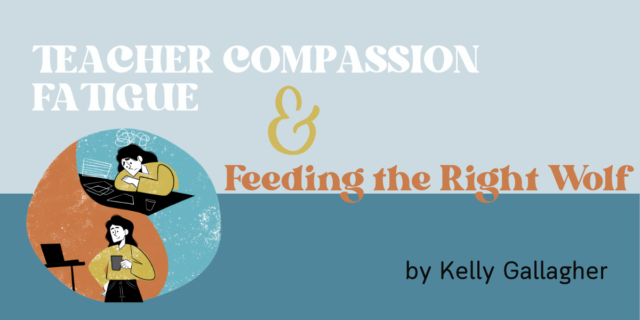
Today we are revisiting part of a conversation between Heinemann authors Penny Kittle and Kelly Gallagher. They share their insights on overcoming student disengagement through authentic book clubs and intentional classroom practices. They explore the effects of educational pressures on both teachers and students and uncover why many high schoolers claim they "don't like reading." If you are looking for inspiration and ideas on balancing academic demands with meaningful connection-driven teaching, this compact episode is for you.
Transcript
Penny Kittle:
I think that we need more moments with kids that make us slide up inside. If you stand back from the work, you see there's strategies and there's these big things, but when you're sitting side by side with a kid, it's really about that kid and their energy to do the hard work of reading, writing, thinking in this complex world that just makes me excited to go back and try again.
Edie:
Yeah. And so with some of that fatigue and burnout, do you think teachers aren't getting enough of this time with students?
Penny:
Yeah, the pressure is cranked up in schools everywhere to make gains faster, which means teachers are pressured to do more with less time. And the sitting side by side with a kid is a thing that people will cut. I don't have time for reading conferences or writing conferences because I've got to keep moving towards, and that pressure means that you then miss those. The moment when a kid told me that his dream is to be a police officer, and I see him differently every time I sit beside him now because I understand what he's really, really wants. And I think that it's not just greeting kids as they come in the door. It's really knowing them as readers, writers and thinkers, as we always say.
Kelly Gallagher:
Hearing you talk about the pressures and all the things that teachers have to teach, reminds me of that old Marzano study in which he studied the standards. And I think this was when Common Core came out and he said to adequately teach the K-12 standards at a level in which kids will get them, you'd have to change K-12 to K-22. And so I think teachers feel that pressure daily. And listening to you talk about your book club experience reminds me also of the book club experience that I've been working with in Anaheim. And entering that classroom. I see one group of kids who are really, really engaged with a book, and then I see another group of kids who are very, very disengaged with the book.
Digging into that disengagement a little bit, one of the things that I found very disheartening was... Because Penny and I have talked for years about how the magic of book clubs like the choice, giving kids good books to read, how just vital that is. Well, and I've been instrumental in Anaheim and getting book clubs up and going in numerous schools. Well, it turns out these 12th grade students walk in the door with a negative attitude about book clubs because teachers have taken those book clubs and drowned them in worksheets and essays and have done the exact same practices that have made kids initially dislike Core works as well.
Penny:
And that is directly connected to the pressure on teachers, right? They're doing that because everyone's saying, "You've got to check their comprehension." You can't just let kids read. There has to be a measure. We have to have a worksheet. We have to have. And so that is this continually defeatist place.
Kelly:
It's interesting because I was with a group of teachers last week and I was telling them about this book club, and the teacher, Robin Turner, friend and colleague of ours, has decided, he was asked, what is the end product? When the book club is over, what is the thing the kids are going to produce? And he said, "Nothing." And this group of teachers, he said, "I just want them to enjoy the reading experience." And these teachers couldn't fathom... It doesn't have to have this massive project attached to it, and no it doesn't.
And I've been thinking a lot about when does that identity happen when a kid says, "I am not a reader." When does that solidify? Right? Because the 12th graders I was working with, it was a long time ago that that had kicked in. And I think when Penny and I, when we wrote 180 days together, we were seeing ninth graders who hadn't read in years. And so the book clubs was our most effective tool in getting kids up and reading again. I mean, there were other tools offering time to read, offering choice, independent reading, but the book club was very, very powerful back then. So I was a little disheartened to see this one group.
The other reason I think they were disconnected is they lack the prior knowledge and background to read it. The group that was super engaged were reading a book called We Are Not From Here, which is an immigration story. And many of the students reading the book have their own family immigration stories in Southern California, and they connected with it. The other book was too far away, I think, from their prior knowledge and background for them to really make that connection. And there were other reasons why it was a difficult text for them to read.
Edie:
So as you've been talking about those identities of students, you're both thinking that solidifies really early for a student?
Penny:
I would say it is continually built. The identity when they're very small is different than the identity as a teenager, as a reader. And so if we assume that once they know how to read, they're going to read without continually working on what do you love to read now. I read The Lord of the Rings in middle school. That was not what I wanted to read in high school or in college. And we have to continually build it. And the things that Kelly mentioned, time to read in class and does everything have to have a product are pretty essential. It's different, right?
Edie:
Yeah.
Kelly:
The teachers we've been working with have said that in this digital age, a lot of kids have really gotten off the reading train. I mean, reading books, which of course has a very deeper and rich reward and benefits than click and go reading, but, and I think it's the phones. I think it's a lot of the digital distractions the kids are having. Most of the kids get to high school, do not like to read. And I think some of that, I think every one of those kids had a tipping point. I agree with Penny. It's a cumulative and so I think it starts very early, but I think the tipping point's at different ages for different kids.
Edie:
Thanks for tuning in today. To learn more about Penny and Kelly's books and read a full transcript, visit blog.heinemann.com. And for 30% off any Heinemann professional book, use code PROFBKS30P.
Penny and Kelly are co-authors of 180 Days: Two Teachers and the Quest to Engage and Empower Adolescents and 4 Essential Studies: Beliefs and Practices to Reclaim Student Agency.



Penny Kittle teaches freshman composition at Plymouth State University in New Hampshire. She was a teacher and literacy coach in public schools for 34 years, 21 of those spent at Kennett High School in North Conway. She is the co-author (with Kelly Gallagher) of Four Essential Studies: Beliefs and Practices to Reclaim Student Agency as well as the bestselling 180 Days.
Penny is the author of Book Love and Write Beside Them, which won the NCTE James Britton award. She also co-authored two books with her mentor, Don Graves, and co-edited (with Tom Newkirk) a collection of Graves’ work, Children Want to Write.
Throughout the year, she travels across the U.S. and Canada (and once in awhile quite a bit farther) speaking to teachers about empowering students through independence in literacy. She believes in curiosity, engagement, and deep thinking in schools for both students and their teachers.
Kelly Gallagher (@KellyGToGo) taught at Magnolia High School in Anaheim, California for 35 years. He is the coauthor, with Penny Kittle, of Four Essential Studies: Beliefs and Practices to Reclaim Student Agency, as well as the bestselling 180 Days. Kelly is also the author of several other books on adolescent literacy, most notably Readicide and Write Like This. He is the former co-director of the South Basin Writing Project at California State University, Long Beach and the former president of the Secondary Reading Group for the International Literacy Association.


